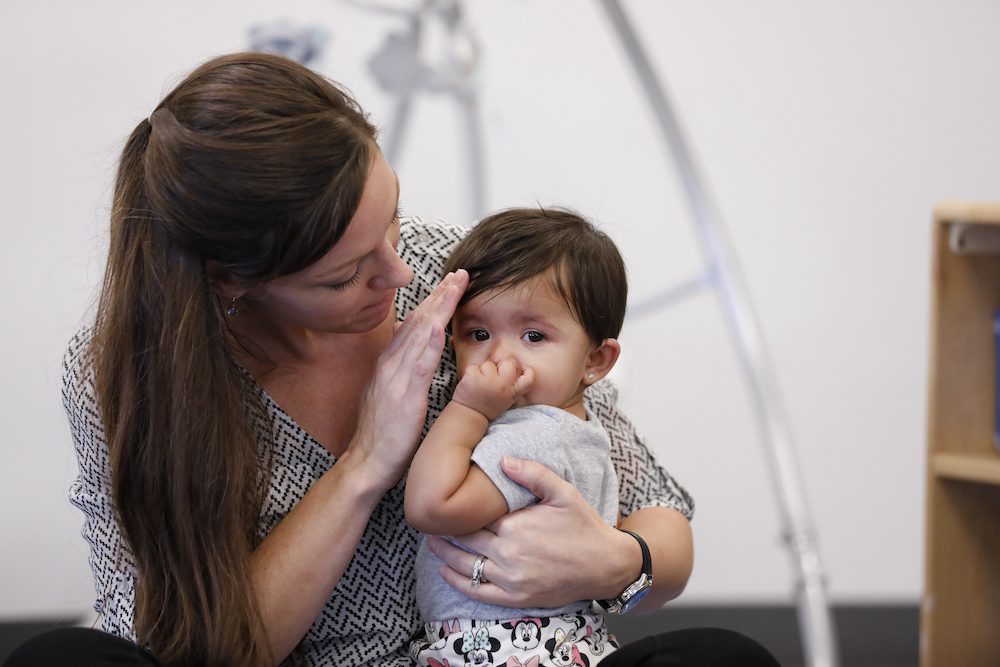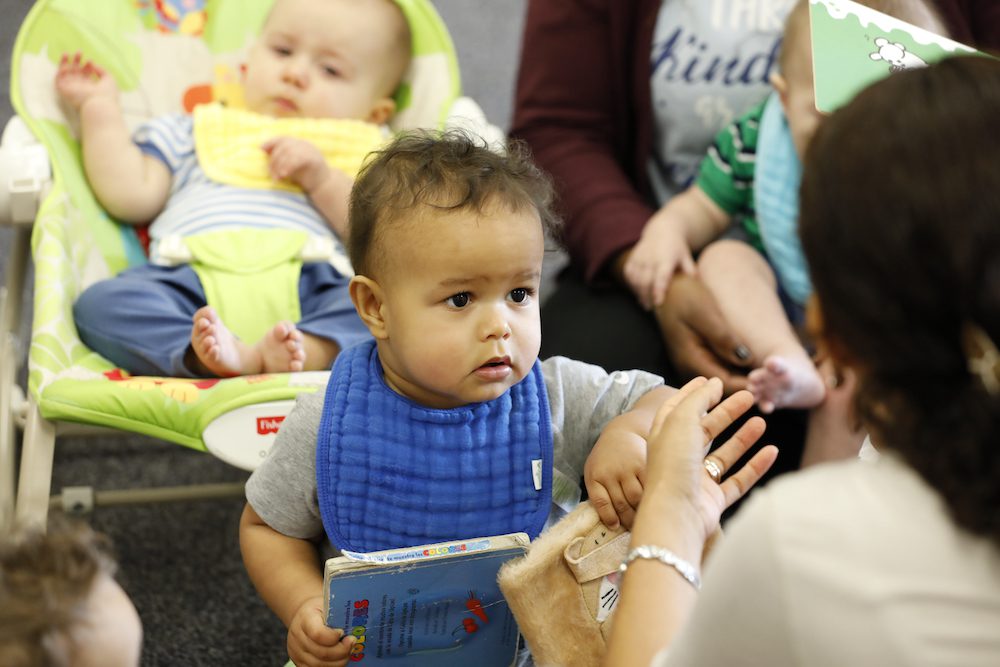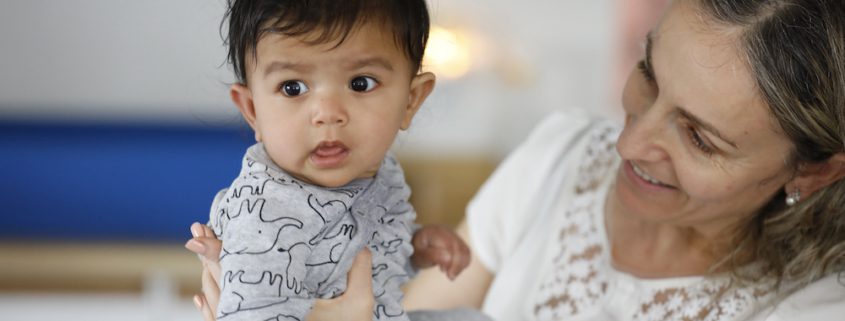The importance of social development in infancy and early childhood is undeniable. Born into the world as social beings, babies are constantly absorbing information in their little worlds.
From noticing social cues to forming connections with the caregivers in their lives, the world of social development is vast and varied — and can be a bit of a learning curve for many new parents.
However, with a bit of research (alongside tapping into those tried and true parental instincts), you will find yourself well-versed on the ins and outs of your baby’s budding social skills — and the many ways to support them.
Social Development in Infancy Timeline
0-2 Months Old
While it may seem like all an infant does in the first two months of life is a never-ending cycle of eating, sleeping, pooping, and repeating, your baby’s social development begins as soon as they enter the world.
From birth, babies are beginning to collect information about their world as they connect with their caregivers through each interaction.
Newborns begin to recognize and respond to their caregivers with smiling, cooing, and gurgling, which indicates their understanding of their actions with others.
You may notice that your baby’s instinctive reflexes (such as sucking) are still intact. Sucking is not only crucial for your baby’s ability to eat and grow; it also is your baby’s best method for self-soothing. Self-soothing is significant and can be a critical factor in your baby’s ability to sleep through the night.
Some other self-soothing behaviors you may notice are:
- Gently stroking nose, ears, or face
- Rubbing eyes
- Holding hands together
This also lays the groundwork for your child’s self-soothe ability as they grow older, demonstrating they trust their ability to comfort themselves. There are many ways you can nurture self-soothing in your baby, such as:
- Supporting your baby to self-settle
- Swaddling with hands or fingers able to touch their face
- Humming softly or stroking hair gently
- Encouraging sensory exploration of self and others
With self-settling and sleeping, be sure to check with your pediatrician to determine what is best for your baby.
These first months lay the foundation for your baby’s sense of security and safety – leading to their ability to trust those around them, which is a crucial part of social development.
Social Development Activities for Infants 0-2 Months Old:
Here is a list of tried and true activities for you and your two-month-old.
- Singing songs
- Rhyming
- Reading books
- Playing peek-a-boo
- Making expressive faces and silly sounds
- Cuddling, rocking, and any form of loving attention that will strengthen your emotional bond with your baby
Another great activity to try out is tummy time. This is an important activity that can begin at the hospital and continues for the first year of your baby’s life. Supervised periods throughout the day on their tummy (while awake) will help your baby adjust to this position and can be great opportunities for activities that support their social development.
- Tummy-to-tummy time is a great way to ease your baby into tummy time while strengthening your emotional bond.
- Introducing a variety of textures or fabrics for your baby to explore while laying on their tummy is a great way to support their sensory development.
- Singing songs, rhyming, talking, and reading books during tummy time is a great way to support their communication skills.
- Be sure to consult with your pediatrician to determine the best approach to tummy time for your baby’s needs.
3 to 6 Months Old
At three months old, one of the most exciting milestones for new parents is their baby’s newfound desire to sleep through the night! This is an exciting chapter for sleep-deprived parents, but do not be alarmed if your baby is not quite there yet! All babies develop at different rates. Some infants may take longer to feel comfortable dozing off alone without a parent nearby or to cling to, while others immediately fall asleep.
Each interaction provides an opportunity to form a deeper bond with their caregivers, deepening their sense of security that will allow them to feel safe enough to explore and grow.
All of these skills build upon one another in your baby’s social development, laying down the foundation for their personality and healthy relationships throughout life.
Social Development Activities for Infants 3-6 Months Old:
- Mirrors, mirrors, mirrors! Babies love to look at themselves in the mirror. Not only is it an engaging activity, but it also allows them to observe facial expressions.
- Kicking and bicycle pedaling. Gently pedal your baby’s legs as though they were riding a bicycle. Hold a mobile or toy above them that they can kick to move around.
- Copycat and imitation. Make animated facial expressions or silly noises, then pause and allow your baby time to mimic them.
- Responding and talking. Respond to your baby’s coos and smiles to encourage their understanding of two-way communication.

6 to 9 Months Old
The social development in infancy skyrockets at six months — this is when you will begin to see your baby’s temperament and personality shine through.
Your baby may begin to pronounce consonants like “ba” and “da” and string their babbles together. Your baby may recognize his or her own name and even begin to express emotions, such as anger, frustration, or happiness.
Babies may begin to experience separation anxiety during this period as they develop object permanence — their understanding that an object (or person) exists when out of sight.
While it can be upsetting to many new parents, this is an exciting new milestone for your baby’s social and cognitive development! Offering compassionate words and loving attention upon your return is the best way to support them during times of distress.
There are also many fun activities to engage your baby during this time and support their development of object permanence, alongside other social-emotional milestones.
Social Development Activities for Infants 6-9 Months Old:
- Activities to support object permanence:
- Peek-a-boo!
- Hide and seek with toys
- Talking to your baby from the other room
- Activities to support communication and language:
- Sign language
- Blowing raspberries
- Name game (Pointing and labeling parts of your face, i.e., “Mommy’s eyes!”)
10 to 12 Months Old
Your baby’s social development from 10 to 12 months is yet another exciting period filled with memorable milestones and new behaviors — some more enjoyable than others!
Your baby may begin to mimic certain actions, such as waving, talking on the phone, or blowing kisses. They may also understand simple concepts, such as “give to me” or “no” — but that does not mean they will always follow them!
Although it can be frustrating, this early defiance is also an exciting milestone in your baby’s social development, demonstrating their self-awareness and independence.
During this period, babies are responsive and eager to play with their caregivers, but they may be fearful of new faces and spaces.
Your baby may be more clingy during this stage, especially in new situations. This is developmentally appropriate and can be supported by acknowledging their fear alongside your trusted sidekicks: loving attention and reassurance.
This can also be a pivotal time for your baby’s language development, as many babies’ first words begin to emerge around 12 months.
However, all children’s expressive language skills develop at a different pace, so don’t be worried if your baby’s first-word debut doesn’t happen by their first birthday!
Many children demonstrate an increase in receptive language skills (their understanding of your words) before their expressive language skills emerge.
Social Development Activities for Infants 10-12 Months Old:
- Shadow puppet play. Create engaging shadow scenes to support your baby’s communication skills.
- Mirrors & reflections. Play “name game” in the mirror together. Make facial expressions in the mirror while labeling the emotions (i.e., “I feel sad”)
- Sing interactive & repetitive songs. Songs like Old MacDonald, Hokey Pokey, and Head, Shoulders, Knees & Toes foster your baby’s expressive and receptive language skills.

Pique Your Child’s Curiosity in Preschool
Supporting your baby’s social development is a lifelong journey that all parents embark on. Each moment and milestone brings a unique opportunity for learning and growth.
Choosing a childcare facility that values the importance of development in infancy is another way parents can support their baby’s learning and growth.
With an emphasis on social development at all ages — from infant to preschool — Cadence Education is committed to supporting your little one’s emotional growth every step of the way.
Our infant program provides personalized care and curriculum in a nurturing environment that feels just like home, giving your family the peace of mind you deserve.
Find a Cadence facility near you to learn about the exceptional early education programs that will enrich your lives as your child thrives.

